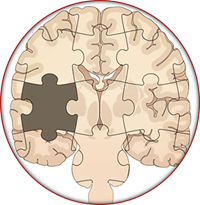 The Center for Neurodegenerative Disorders in the Indiana University School of Medicine-Indiana University Health Neuroscience Institute is a multidisciplinary center committed to maximizing scientific collaboration and discovery in neurodegenerative disorders while providing cutting edge, compassionate and comprehensive care to those living with Alzheimer’s disease and related neurodegenerative disorders and their caregivers.
The Center for Neurodegenerative Disorders in the Indiana University School of Medicine-Indiana University Health Neuroscience Institute is a multidisciplinary center committed to maximizing scientific collaboration and discovery in neurodegenerative disorders while providing cutting edge, compassionate and comprehensive care to those living with Alzheimer’s disease and related neurodegenerative disorders and their caregivers.
Vision

Donna M. Wilcock, PhD
Barbara and Larry Sharpf Professor of Alzheimer's Disease Research
Clinical Programs
An expansion of Alzheimer’s and Dementia Care Services, the Brain Health Program offers the latest disease-modifying therapies to individuals with mild cognitive impairment or early-onset dementia.
IU Health Neuroscience Center has received several accreditations and is certified as a Center of Excellence by the ALS Association, only one of its kind in Indiana. Our services meet national standards, and we offer neurological diagnostics, imaging and on-site support therapies from highly experienced physicians.
IU School of Medicine Department of Neurology is home to the only designated Parkinson’s Foundation Center of Excellence in Indiana. This recognition indicates that IU School of Medicine Department of Neurology faculty are experts in providing state-of-the-art comprehensive services for people with Parkinson’s disease.
IU School of Medicine is a designated Center of Excellence by the Huntington’s Disease Society of America. As part of a network of 47 Centers of Excellence across the country, IU School of Medicine provides an elite team approach to Huntington’s Disease care and research.
The complex care clinic is a multi-disciplinary clinic that has been established to provide care for more complex patients who require additional time and clinical support. It involves neurology, pulmonology, physical and occupational therapy, speech therapy, genetics, and social work. The objective is provide a streamlined and comprehensive opportunity for patients to receive care from multiple providers in a single day.
Education
The Department of Neurology at IU School of Medicine offers a one-year Movement Disorders Fellowship for trainees who have an ACGME-accredited four-year residency in Neurology. Fellows train with leading experts in Deep Brain Stimulation, Parkinson's disease, Huntington's disease, dystonia and other movement disorders at multiple facilities including the IU Health Neuroscience Center, Eskenazi Health and the Richard L. Roudebush Veterans' Administration Medical Center.
The Department of Neurology at IU School of Medicine offers a UCNS-accredited Behavioral Neurology & Neuropsychiatry (BNNP) Fellowship program. The core mission of this program is to prepare clinical experts in cognitive and behavioral neurology and neuropsychiatry. This two-year clinical fellowship provides a broad exposure to a variety of conditions seen in the outpatient behavioral neurology and neuropsychiatry clinics with a focus on dementing illnesses and provides both clinical and research training.
Research Partners
Stark Neurosciences Research Institute is dedicated to improving outcomes for persons suffering from disorders of the nervous system. For more than 20 years, the research institute has provided a collaborative space at the IU School of Medicine where scientists and clinician-scientists from different disciplines can work together on translational science to investigate devastating disorders, ultimately seeking novel therapeutics to treat patients alongside partnering physicians.
The Indiana Alzheimer's Disease Research Center was established in 1991 to bring together investigators and institutional resources at IU School of Medicine. At the forefront of Alzheimer’s disease research for nearly 35 years, the research center is one of 37 centers in the United States solely committed to Alzheimer’s disease research. The center supports the U.S. National Alzheimer’s Project Act to prevent and effectively treat Alzheimer’s disease by 2025 through innovative research on etiology, early detection and therapeutics. Signed by President Barack Obama, the act offers a historic opportunity to address the many challenges facing people with Alzheimer’s disease and their families.
The Model Organism Development and Evaluation for Late-Onset Alzheimer’s Disease (MODEL-AD) consortium, established by the National Institute on Aging, brings together experts at IU School of Medicine, Jackson Laboratory, the University of Pittsburgh School of Medicine and Sage Bionetworks. The consortium is developing the next generation of animal models used by scientists throughout the United States to study contributors to Alzheimer’s disease and test potential treatments.
Researchers in the Target Enablement to Accelerate Therapy Development for Alzheimer’s Disease (TREAT-AD) drug discovery center search for new therapeutic targets and molecules to accelerate the development of promising new drugs for Alzheimer’s disease at IU School of Medicine and other research institutions.
The Longitudinal Early-Onset Alzheimer’s Disease Study (LEADS), the largest study of its kind in the world, is interested in exploring sporadic early-onset Alzheimer's disease. The observational study follows 100 cognitively normal patients and 600 participants who have some type of cognitive impairment — typically either early-onset Alzheimer’s disease or mild cognitive impairment due to Alzheimer’s disease — at 18 sites across the United States and five international sites in Europe and South America.
This study, titled Centrally-linked Longitudinal Peripheral Biomarkers of AD (CLEAR-AD) is a jointly-led effort of the IU School of Medicine and the Mayo Clinic in Florida that will connect more than 40 experts and 13 institutions across the country and abroad to collaborate and advance Alzheimer’s disease research in a number of new directions.
The National Centralized Repository for Alzheimer’s Disease and Related Dementias (NCRAD) provides critical access to more than half a million biological samples from people with Alzheimer’s disease.
The Dage lab is focused on the discovery and development of biomarkers to aid in the understanding of neurodegenerative diseases.
The Apostolova lab focuses on early-onset Alzheimer’s disease and the development and validation of imaging and genetics biomarkers.
The Wilcock lab was established in 2011 with a focus on vascular contributions to cognitive impairment and dementia (VCID) and neuroinflammation in VCID and Alzheimer’s disease